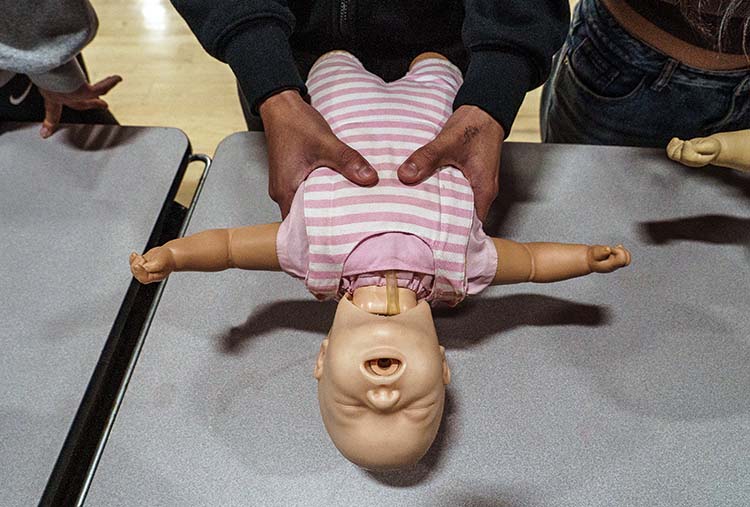Renovation eviction ban seems to be keeping people housed

Lydia Hernandez fought hard to get a just cause eviction ordinance passed in Claremont. Now that the ordinance is law, she can breathe easier but still would like to see more renter protections. Courier photo/Steven Felschundneff
by Steven Felschundneff | steven@claremont-courier.com
It’s been just over a month since a sweeping new ordinance to shield Claremont’s renters from specific no-fault evictions became the law of the land, and already it appears to have proven effective.
The push to pass the “Just Cause for Eviction” ordinance was initiated last July after tenants of Monarch Terrace, on Bucknell Avenue and Vista Drive, received a phone call from their landlord offering a buyout. The caller also stated that those who did not take the money would be removed from their homes when Covid-era eviction restrictions ended on January 1, 2023.
The landlord, Revere Investments, wanted everyone out so it could renovate the units and lease them at a much higher monthly rent, a practice known as “renoviction.”
The ordinance, which went into effect June 22, prevents landlords from evicting a tenant in good standing to renovate the unit, unless it is necessary to “bring the rental unit into compliance with applicable codes and laws affecting the health and safety of tenants or the building.”
Additionally, the rules would require landlords to secure building permits from the city and provide tenants with copies of the permits; provide proof that the remodel will take longer than 30 days and that the work can not reasonably be accomplished with the tenant in the unit; and the cost of the remodel must be at least six times what the tenant is paying in monthly rent.
“Those of us who are long-term tenants breathed a sigh of relief that we are not going to get these notices anymore,” said Lydia Hernandez who lives at Monarch Terrace. “That is people in my complex and friends in other complexes.”
Hernandez said there have been no letters or buyout offers from the landlord since the law passed.
“No one has received any offers to leave the place but that was because they did have success with their original cash for keys effort, they did get a bunch of people out,” Hernandez said.
She estimated about a dozen longtime tenants at Monarch Terrace will be able to stay because of the ordinance. However, the law applies to the entire city, so the total impact is certainly much greater.
Construction at the complex has been more or less nonstop since the landlord embarked on the effort to remove long-term tenants. Hernandez estimates three to four apartments are currently being updated and several others are completed but remain vacant.
On Wednesday a popular online real estate listing service offered two units at the complex for lease including a two bedroom unit for $3,095 per month and a three-bedroom unit for $3,295. Both had nearly identical decor and included “new paint, new hardwood-style flooring throughout, brand new kitchen cabinets and bathroom vanities, custom tile backsplash, quartz countertops, new LED recessed lighting, and all new windows and sliding doors,” according to the listing.
Many longtime tenants chose to leave Monarch Terrace either because other options became available or they simply could not tolerate the anxiety and stress of not knowing what would come next, Hernandez said. Some, she said, “literally could not sleep at night,” so they just moved.
Those who stayed held an informal get together recently to celebrate the one year anniversary of the eviction scare and the passage of the new ordinance.
“We were very appreciative of each other because we knew it took all of us [to get the law passed]. Several of us were speaking constantly at the council meetings, others were writing letters,” Hernandez said. “In one way or another everyone who has benefited has at least at one point been active in helping us fight for our homes, [and] our right to remain in the community.”
Hernandez said the fight is just halfway done and that now the residents of Monarch Terrace, along with the local advocacy group Claremont Tenants Union, want to see some kind of rent stabilization ordinance passed in Claremont.
Simply put, rent stabilization is a yearly cap on how much a landlord can raise the rent. Under current state law, Assembly Bill 1482, the Tenant Protection Act of 2019, rent can be increased by the local inflation rate, consumer price index, plus 5% as long as it doesn’t exceed 10% total. For example, the current CPI in Los Angeles County is 3.8% so this year landlords can raise rents by 8.8%.
Hernandez is a teacher at Sycamore Elementary and her union just negotiated a 2.7% pay raise, but if her rent goes up by nearly 9% she will be left with less in her pocket each month.
In recent years high inflation meant rent jumped by 10% annually, meaning of course it takes roughly 10 years for the rent to double. The Claremont Tenants Union would like to see Claremont pass its own rent stabilization rules which would cap the yearly increase at 3 to 4%.
“Rent stabilization is the number one thing we would like to see done,” Hernandez said.
In June the city convened a special stakeholders meeting to gather ideas regarding an anti-harassment ordinance for tenants and landlords. That meeting included Hernandez, two other advocates for tenants’ rights, and three advocates for landlord organizations, as well as assistant to the city manager Katie Wand and city attorney Alisha Patterson. Hernandez said the tenants came to the meeting prepared with ideas for the new law but advocates for the landlord groups just stonewalled.
“We thought we were coming together in good faith to have this talk,” she said. “The other side absolutely refused to make movement on even the most general of terms.”
On Wednesday, Wand said the meeting was just the first step in putting together the future contents of an anti-harassment ordinance and expects more meetings this fall, with the final draft going to the City Council at a later date.
Back in May, the council voted unanimously to allocate $1 million in American Rescue Plan Act money to fund the Temporary Housing Stabilization and Relocation Program, which would provide rent payment grants to tenants as well as money for owners to make needed improvements.
Wand said as of this week the city has received 58 applications for rental assistance and has allocated $120,000 to tenants to help with rent payments. The grants come in two tiers, one aimed at shoring up a temporarily shortfall and another aimed at very low income tenants who need sustained assistance. She said the majority of grants provided were to very low income people with the city providing monthly stipends for an entire year.










0 Comments